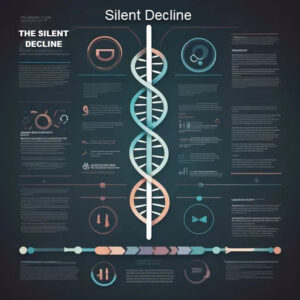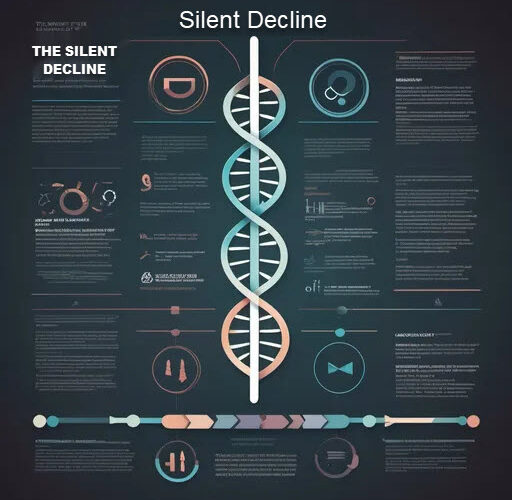Introduction to Y-Chromosome Loss
Definition of Y-Chromosome Loss and its Significance
 Y-chromosome loss refers to the absence or deletion of the Y chromosome in male cells. This phenomenon is significant as it can lead to a range of health issues, including infertility and an increased risk of certain diseases. The Y chromosome plays a crucial role in male sex determination and development. Its loss raises concerns about population dynamics and genetic diversity in future generations.
Y-chromosome loss refers to the absence or deletion of the Y chromosome in male cells. This phenomenon is significant as it can lead to a range of health issues, including infertility and an increased risk of certain diseases. The Y chromosome plays a crucial role in male sex determination and development. Its loss raises concerns about population dynamics and genetic diversity in future generations.
Overview of Chromosomal Sex Determination
Chromosomes are structures that carry genetic information. In humans, sex determination primarily relies on the presence of specific chromosomes. Typically, females have two X chromosomes (XX), while males possess one X and one Y chromosome (XY). The Y chromosome contains key genes that trigger male development. Disruption in this balance due to Y-chromosome loss can have profound implications for reproductive biology.
Historical Context of Y-Chromosome Research
Research into the Y chromosome has evolved significantly over the past century. Early studies focused on identifying the role of the Y chromosome in male sex determination. As technology advanced, scientists began to explore its genetic content and the implications of any losses. Recent findings highlight that Y-chromosome loss is not just a biological anomaly but a phenomenon with far-reaching consequences for human health and evolution.
The Biological Mechanisms of Y-Chromosome Loss
Cellular Processes Contributing to Y-Chromosome Erosion
The Y-chromosome is vital for male development and fertility. Its erosion involves several cellular processes. One primary process is the accumulation of mutations. These mutations can lead to the inactivation of important genes. Over generations, these genetic alterations accumulate. This accumulation can result in significant loss of function, leading to a gradual decline in the Y-chromosome’s integrity.
Another contributing factor is the process of recombination. In most species, Y-chromosomes do not undergo recombination with X-chromosomes. This absence of genetic exchange leads to a lack of genetic diversity. As a result, deleterious mutations persist without being eliminated. Such processes accelerate the erosion of the Y-chromosome over time.
Genetic Mutations and Environmental Factors Influencing Loss
Genetic mutations are not the sole contributors to Y-chromosome loss. Environmental factors also play a crucial role. For example, exposure to certain chemicals can induce mutations. Some heavy metals and endocrine disruptors can alter male reproductive health. These external factors can compound genetic issues, leading to accelerated Y-chromosome loss.
Additionally, lifestyle choices may influence the rate of Y-chromosome erosion. Factors like diet, stress, and exposure to radiation can affect cellular processes. The interaction between genetic predisposition and environmental stressors creates a complex landscape for understanding Y-chromosome loss.
Comparison of Species with and without Y-Chromosome Loss
Research shows significant differences when comparing species with Y-chromosome loss and those without. In species like humans, the Y-chromosome is notably eroded over generations. This erosion leads to a gradual decline in male fertility. In contrast, species like mice maintain a stable Y-chromosome. Their Y-chromosome continues to function well, demonstrating a different evolutionary path.
Additionally, some species exhibit alternative sex determination systems. For instance, certain reptiles use temperature-dependent sex determination. This system does not rely on a Y-chromosome, highlighting evolutionary diversity. Such comparisons provide insight into how different mechanisms influence Y-chromosome stability and function across various species.
Current Research and Findings
Summary of Recent Studies on Y-Chromosome Decline
Recent studies reveal significant findings regarding Y-chromosome loss. Research indicates a steady decline in Y-chromosome presence in various populations. A notable study showed a reduction of about 30% in the Y-chromosome among men over the last century. Another analysis suggests that this decline may lead to a complete loss of the Y-chromosome within a few generations if trends continue.
Statistical Trends in Male Population Demographics
Statistical trends highlight alarming shifts in male demographics. Data from several countries indicate a decrease in male births. For instance, the ratio of male to female births has shifted from 105:100 to approximately 103:100 in some regions. This trend correlates with increasing rates of infertility and genetic disorders linked to Y-chromosome loss. Such statistics raise questions about the long-term viability of male populations.
Implications of Findings for Future Research
The implications of these findings are profound. Future research must address the biological mechanisms behind Y-chromosome decline. Investigating how environmental factors and lifestyle choices impact Y-chromosome integrity will be crucial. Additionally, understanding the socio-economic effects of altered male-to-female ratios may inform public health policies. Ongoing research will need to focus on genetic diversity and potential solutions to mitigate the consequences of this decline.
Potential Consequences for Future Generations
Effects on Male Fertility and Genetics
The loss of the Y chromosome can have significant effects on male fertility. Studies show that men with a degraded Y chromosome may face infertility. This is due to the absence of vital genes required for sperm production. As a result, there could be a decrease in the male birth rate. Genetic disorders linked to Y chromosome loss may also rise among men. Conditions such as Turner syndrome might become more prevalent in future generations.
Possible Implications for Gender Balance in Society
The decline of the Y chromosome could create a shift in gender balance. If fewer males are born, society may face challenges. A reduced male population could lead to an increased female-to-male ratio. This imbalance might affect social dynamics, including marriage and family structures. Moreover, the perception and role of gender in society could change significantly over time. Possible outcomes include changes in societal norms and expectations related to gender roles.
Long-term Evolutionary Consequences of Y-Chromosome Loss
The long-term evolutionary consequences of Y-chromosome loss are profound. Evolution may lead to a new equilibrium in human genetics. This could result in changes to sexual reproduction and genetic diversity. If the Y chromosome continues to degrade, alternative systems of sex determination may emerge. These shifts could impact human adaptability to environmental changes. Over generations, these effects could reshape human evolution significantly.
Societal and Ethical Considerations
Public Perception and Understanding of Genetic Decline
The decline of the Y chromosome raises concerns for the future. Many people lack basic knowledge about genetics, particularly regarding the implications of Y-chromosome loss. Public awareness is crucial. Misunderstandings can lead to fear and stigma associated with genetic decline. Educating the public can empower informed discussions about the impact of genetic changes on society. Genetic literacy initiatives can foster better comprehension. These efforts should focus on the role of the Y chromosome in male development and reproduction.
Ethical Implications of Genetic Engineering
Genetic engineering offers potential solutions to counteract Y-chromosome loss. However, ethical considerations arise. For example, the manipulation of genes can lead to unforeseen consequences. The question of whether it is right to alter human genetics is complex. There is a concern about equity in access to such technologies. Wealthy individuals may benefit more than others, exacerbating social inequality. Therefore, these ethical dilemmas must be addressed. Open debates about the morality of genetic interventions are essential. This includes evaluating long-term effects on genetic diversity and human identity.
Role of Policy-Making in Addressing Genetic Issues
Policy-making plays a critical role in managing genetic issues related to Y-chromosome loss. Governments must regulate genetic engineering practices. Clear guidelines can ensure ethical research and application. Policymakers should also support public education initiatives. This approach will help mitigate misinformation. Collaborative efforts between scientists, ethicists, and lawmakers are necessary. They can work to create responsible frameworks that balance innovation with ethical standards. A proactive regulatory environment can guide society through the challenges posed by genetic decline.
Conclusion and Future Directions
Recap of Major Points Discussed
In this article, we explored the silent decline of the Y-chromosome and its implications for future generations. We discussed how Y-chromosome loss can affect genetic diversity and male fertility. The impacts of environmental factors, lifestyle choices, and health issues on Y-chromosome dynamics were highlighted. These factors contribute to a concerning trend that could shape the demographic landscape.
Importance of Continued Research
Continued research on Y-chromosome dynamics is vital. Scientists must delve deeper into the mechanisms behind Y-chromosome loss. Understanding these dynamics can lead to more effective strategies for preserving male fertility and genetic health. Future studies should also focus on the socio-economic implications of a declining male population. The findings can inform health policies and public awareness campaigns.
Call to Action
Scientists and policymakers should collaborate to address the Y-chromosome loss issue. There is a need for funding research initiatives focused on male fertility. Policymakers should consider implementing programs that promote reproductive health. Additionally, creative works, such as T. R. Schneider’s Zhiva Legacy Series, highlight these concerns. They raise awareness and stimulate discussion on male fertility. This dialogue is essential for making informed decisions that can positively impact future generations.





